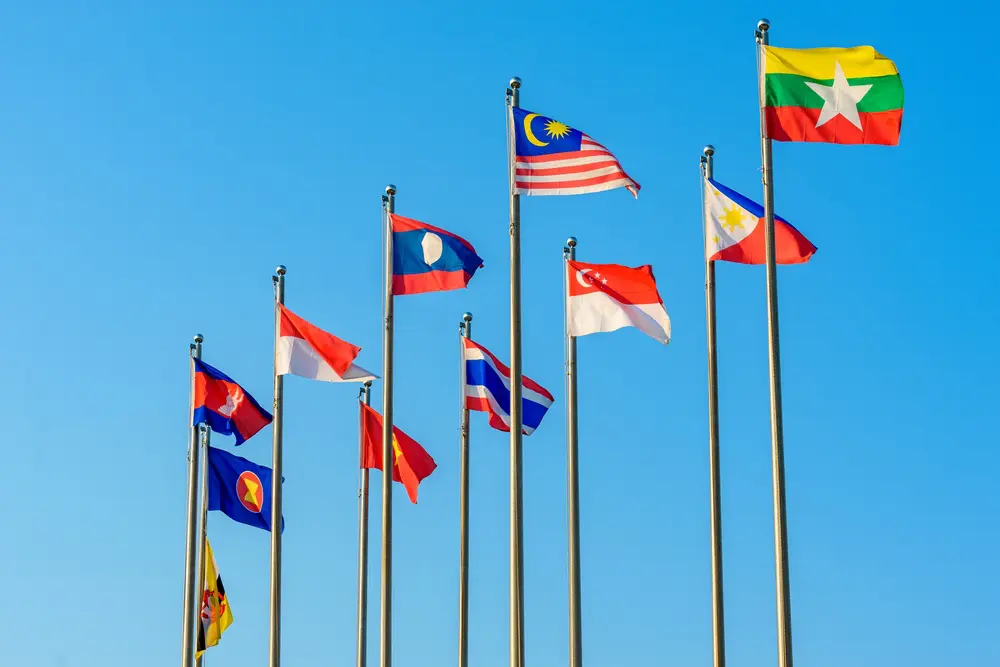
National flag of Association of Southeast Asian Nations (or ASEAN) regional intergovernmental organization.
At the end of last year, in Brussels, an important summit took place between the European Union and the ASEAN trade bloc, which comprises a host of fast-growing Southeast Asian economies. As the ASEAN bloc also closed a free trade agreement with Australia and New Zealand in 2009, the recent summit is of major importance. The Southeast Asian region counts a whopping 656 million inhabitants, and thus it offers huge potential for trade.
Despite ongoing efforts, a proper free trade agreement (FTA) between the EU and ASEAN is not expected anytime soon. Veteran Indian diplomat Gurjit Singh has observed that one important reason for this impasse is the long list of sanctions imposed upon Cambodia and Myanmar as a response to human rights violations. As a result, bilateral trade deals are currently more realistic.
During the summit, European Commission President Ursula von der Leyen stressed that, on the upside, the EU had already signed FTA deals with Vietnam and Singapore, adding “We want to trade more with each other. We already are each other’s third largest trading partners,” and “Our ultimate goal would be to negotiate a region-to-region free trade agreement.”
Other fierce disagreements exist, however. At the EU-ASEAN Summit, Indonesian President Jokowi lashed out at the EU, issuing a warning related to the EU’s new Deforestation Regulation, adding that the EU should not attempt to dictate its standards to ASEAN if it wants to maintain its relationship with Indonesia going forward.
He said: “There must be no coercion, no more parties who always dictate and assume that my standards are better than yours.” Indonesian Foreign Affairs Minister Retno Marsudi added that the Regulation will “hinder trade” and is “discriminatory in nature,” warning that this would “hamper Indonesia’s commodity exports.”
Notably, Indonesia is fostering new relationships with trading partners other than the EU. It is planning to negotiate a new FTA with the Eurasian Economic Union and it is eying deeper economic and strategic ties with the U.S.
Small family businesses in countries like Indonesia and Malaysia—both important exporters of palm oil—could be harmed by the EU’s deforestation regulation, which threatens to add a lot of bureaucracy to imports of palm oil into the EU.
The irony is that the rules are being implemented just when deforestation from palm oil has decreased to its lowest level since 2017, according to think tanks like Chain Reaction Research, and when Malaysian firms like Sime Darby—the world’s largest producer of certified sustainable palm oil—have pledged to achieve net-zero emissions by the year 2050 as part of their sustainability agenda. In Sabah and Sarawak, the company also intends to reforest a 400-hectare area of peat crops.
Ultimately, this is all really about the EU forcing its own standards on trading partners. This is clear especially in comparison to the UK, which requires products to be in line with the local regulations, thereby effectively applying the principle of mutual recognition.
The EU’s new regulatory initiative really smells of protectionism, especially since eliminating palm oil from the supply chain would worsen deforestation, since alternatives produced in Europe, like sunflower or rapeseed oil, require more land, water, and fertilizers.
These events ought to be seen in light of a greater development, namely the Western world’s economic “decoupling” from Russia and China. As much as it is a good idea to avoid excessive geo-strategic dependence, it is clear that protectionist forces of all stripes will try to abuse this process, which seems to have accelerated since the COVID crisis. The West should attempt to compensate for any trade destruction, justified on the basis of geo-security, by opening up trade with parts of the world that are broadly friendly with the West. Southeast Asia is most certainly such a region, and its growth prospects are still enormous, so it really should be a no-brainer to see this region as a priority. Any political differences mostly revolve around issues that can be resolved, so it would be a pity if more political capital is not invested in closer trade ties between the EU and ASEAN.
